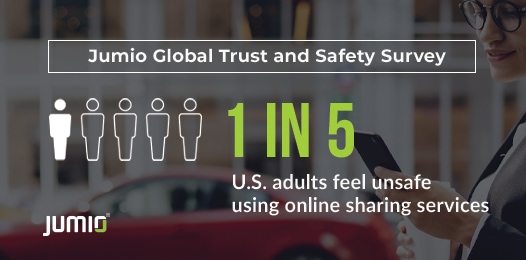
More than five years after the sharing economy emerged, consumers still report trust and safety concerns and claim digital identity verification is very important
Only two-thirds of U.S. adults feel “very safe” or “somewhat safe” using online sharing services like Uber or Lyft, and one in five U.S. adults feel “somewhat unsafe” or “not safe at all,” according to data today released from the Global Trust and Safety Survey by Jumio, the leading AI-powered trusted identity as a service provider.
The sharing economy — often defined as a peer-to-peer exchange of goods and services that is facilitated by an online platform — is forecasted to have 86.5 million users by 2021 and is expected to skyrocket to $335 billion by 2020, an increase of 2,293 percent since it first emerged in 2014 as a $14 billion industry. This growth is fueled by convenience, cost and the principles of trust and safety.
However, the promise of the sharing economy is being challenged if one-fifth of U.S. consumers (18.1 percent) report feeling unsafe participating in online sharing services, and it’s important for businesses to take the necessary steps to regain consumer trust.
The Role of Trust in the Sharing Economy
Trust — the expectation that all parties are who they say they are and are operating in good faith — is a prerequisite for the sharing economy to thrive. Eighty-nine percent of consumers recently surveyed by PwC agreed that the sharing economy marketplace is based on trust between providers and users.
“Online sharing services are facilitating an in-person meeting between two strangers, so it is imperative that businesses foster a relationship of trust and an environment of safety to protect all parties involved,” said Robert Prigge, Jumio president. “These businesses are tasked with the difficult challenge of establishing digital trust between both the provider and user. The first step in establishing a digital chain of trust is ensuring, beyond any doubt, that a person’s digital identity matches their physical identity and they are who they claim to be.”
Verifying Digital Identity is Important to Consumers
Verifying digital identity is important to building trust and operating safely in the sharing economy. According to the Jumio Global Trust and Safety Survey, nearly three-fourths of U.S. consumers (71.2 percent) believe it’s either “somewhat important” or “very important” that online sharing services incorporate an identity verification process with new users and service providers. Furthermore, half of U.S. consumers (50 percent) would be willing to undergo an online identity check for an online sharing service.
Online Identity Verification is Evolving
Online identity verification — an industry that is expected to grow to $20 billion by 2022 — is evolving as traditional methods of identity verification, such as knowledge-based authentication and SMS-based two-factor authentication, are no longer secure ways to verify user identity. The online economy is continuing its transition from traditional verification to digital verification, and many companies in the sharing space are struggling to catch up.
“Imagine a scenario where a user has legitimately applied to and been approved for a new sharing service. A few months later, the user’s phone is lost or stolen. In this scenario, the sharing service provider would need to re-authenticate the user to prove that the person logging in and using their service is actually the account owner,” said Prigge. “In sharing economy services, it’s crucial to implement a secure, and reliable, biometrics-based authentication method which can be done in seconds to establish definitive trust between both parties in the transaction.”
By leveraging advanced technology — including 3D liveness detection, biometric facial recognition, machine learning, artificial intelligence and human review — digital identity verification services verify an individual’s identity against a government-issued ID to accurately confirm they are who they say they are. Advancements in ongoing user authentication can provide ongoing user authentication in seconds with a video-selfie to re-verify the identity of sharing economy service providers, like ride-sharing drivers, on a frequent basis, providing continuous security.
To view complete results of the Jumio Global Trust and Safety Survey and to learn more about the state of trust and safety in the sharing economy, download a copy of Jumio’s Ultimate Guide to Trust & Safety in the Sharing Economy. For more information on Jumio, digital identity verification and ongoing user authentication, please visit www.jumio.com.
About the Jumio Global Trust and Safety Survey
The Jumio Global Trust and Safety Survey was conducted online by Google Surveys and commissioned by Jumio. The study was conducted in December 2018 and polled 1,000 U.S. adults and 1,000 U.K. adults to gauge usage and perception of safety related to online sharing services. All respondents were 18 years or older. For complete survey results, download Jumio’s Ultimate Guide to Trust & Safety in the Sharing Economy.
About Jumio
When identity matters, trust Jumio. Jumio’s mission is to make the internet a safer place by protecting the ecosystems of businesses through cutting-edge online identity verification and authentication services that quickly and accurately connect a person’s online and real-world identities. Jumio’s end-to-end identity verification solutions fight fraud, maintain compliance and onboard good customers faster.
Leveraging advanced technology including augmented intelligence, AI, biometrics, machine learning, certified 3D liveness detection and human review, Jumio helps organizations meet regulatory compliance including KYC, AML and GDPR and definitively establish the digital identity of their customers. Jumio has verified more than 170 million identities issued by over 200 countries and territories from real-time web and mobile transactions. Jumio’s solutions are used by leading companies in the financial services, sharing economy, digital currency, retail, travel and online gaming sectors. Based in Palo Alto, Jumio operates globally with offices in North America, Latin America, Europe and Asia Pacific and has been the recipient of numerous awards for innovation. For more information, please visit www.jumio.com.
Media Contacts
U.S. Media Contact
Jake Kasowski
10Fold Communications
[email protected]
(360) 635-8646
Europe Media Contact
Gemma Lingham
FleishmanHillard Fishburn
[email protected]
+44-208-618-2812
